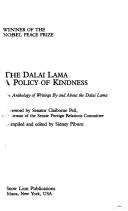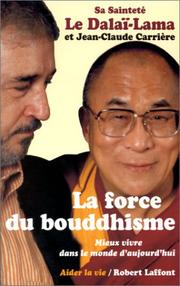| Listing 1 - 10 of 13 | << page >> |
Sort by
|

ISBN: 0937938912 Year: 1991 Publisher: New York Snow Lion Publications
Abstract | Keywords | Export | Availability | Bookmark
 Loading...
Loading...Choose an application
- Reference Manager
- EndNote
- RefWorks (Direct export to RefWorks)
Book
ISBN: 2715808259 Year: 1990 Publisher: Paris Balland
Abstract | Keywords | Export | Availability | Bookmark
 Loading...
Loading...Choose an application
- Reference Manager
- EndNote
- RefWorks (Direct export to RefWorks)
Book
ISBN: 2855652499 Year: 1984 Publisher: Paris Orban
Abstract | Keywords | Export | Availability | Bookmark
 Loading...
Loading...Choose an application
- Reference Manager
- EndNote
- RefWorks (Direct export to RefWorks)
Book
Year: 1962 Publisher: Jérusalem: Weidenfeld and Nicolson,
Abstract | Keywords | Export | Availability | Bookmark
 Loading...
Loading...Choose an application
- Reference Manager
- EndNote
- RefWorks (Direct export to RefWorks)
Book
ISBN: 2867050871 9782867050879 Year: 1989 Publisher: [Paris]: Lieu commun,
Abstract | Keywords | Export | Availability | Bookmark
 Loading...
Loading...Choose an application
- Reference Manager
- EndNote
- RefWorks (Direct export to RefWorks)
Book
Year: 1970 Publisher: Boston : Houghton Mifflin,
Abstract | Keywords | Export | Availability | Bookmark
 Loading...
Loading...Choose an application
- Reference Manager
- EndNote
- RefWorks (Direct export to RefWorks)
Bstan-'Dzin-Rgya-Mtsho, Dalai Lama --- Tibet Autonomous Region (China) --- History.
Book
ISBN: 9783429032173 3429032172 Year: 2010 Publisher: Würzburg: Echter,
Abstract | Keywords | Export | Availability | Bookmark
 Loading...
Loading...Choose an application
- Reference Manager
- EndNote
- RefWorks (Direct export to RefWorks)

ISBN: 2221078365 9782221078365 Year: 1995 Publisher: Paris: Laffont,
Abstract | Keywords | Export | Availability | Bookmark
 Loading...
Loading...Choose an application
- Reference Manager
- EndNote
- RefWorks (Direct export to RefWorks)
Dalai lamas --- Dalaï-lamas --- Bstan-'dzin-rgya-mtsho, --- Dalaï-lamas --- Bstan-ʼdzin-rgya-mtsho, --- #GGSB: Oosterse religie --- #GGSB: Spiritualiteit --- Buddhism --- Bouddhisme --- Interviews --- Oosterse religie --- Spiritualiteit
Book
ISBN: 9789020988345 Year: 2010 Publisher: Tielt Lannoo
Abstract | Keywords | Export | Availability | Bookmark
 Loading...
Loading...Choose an application
- Reference Manager
- EndNote
- RefWorks (Direct export to RefWorks)
Bstan-'dzin-rgya-mtsho --- Political and social views --- Spiritual biography --- Buddhism --- China --- Tibet Autonomous Region (China) --- Dalai lamas --- Biography --- Religious life --- Buddhism and social problems
Dissertation
Year: 2019 Publisher: Louvain-la-Neuve: UCLouvain,
Abstract | Keywords | Export | Availability | Bookmark
 Loading...
Loading...Choose an application
- Reference Manager
- EndNote
- RefWorks (Direct export to RefWorks)
This research tries to identify, in the works of political actors who are looked as wise, the elements of a method we could use today in our coexistence. We make the assumption that there is a community of wisdom across time and cultures. In order to check this, we are comparing the works of Confucius (6th century BC), Marcus Aurelius (2nd), Montaigne (16th century), Gandhi (19th / 20th century) and Tenzin Gyatso, the 14th Dalai Lama (20th / 21st century). All are widely regarded as wise, in academic and popular publications. We are building our work on the one of François Jullien, contemporary philosopher and sinologist: his approach by poles, some of his concepts and his analysis of wisdom. Despite his criticisms of the comparative approach, we are using it. We are following the work of Edgar Morin, where we find notions to specify points of comparison related to humanity and not to any particular culture. At the end of the comparison, it appears that the five sages have a lot in common: the adhesion to change, the priority given to the need and not the desire, the self-improvement, the spirit as key to access to the world, the idea of a coherent reality, root of the solidarity. Finally, we are drawing an practical wisdom, a way of life that can be schematized by a set of biases, orientations and practical options. This work work fits into the traditional approach of "philo-sophy", the love of wisdom. It is also part of a philosophy of wisdom, a reflective approach in the spirit of the philosophy of science or religion. This approach exists in the Anglo-Saxon world, but is not yet very present in the French-speaking academic space, Cette thèse cherche à identifier, chez des auteurs politiques considérés comme étant des sages, des éléments de méthode susceptibles d'être utilisés aujourd'hui dans une action pour coexister au mieux. Nous faisons l'hypothèse qu'il existe une communauté de sagesse à travers le temps et les cultures. Afin de la vérifier, nous comparons les œuvres de Confucius (VIe siècle av. JC), Marc Aurèle (IIe), Montaigne (XVIe), Gandhi (XIX/XXe) et Tenzin Gyatso, le 14e Dalaï lama (XX/XXIe). Tous sont largement tenus pour sages, comme l'indiquent moult recherches et une notoriété populaire. Nous construisons notre travail sur celui de François Jullien, philosophe et sinologue contemporain : son approche par pôles, certaines de ses notions et son analyse de la sagesse. Malgré ses critiques de l'approche comparative, nous empruntons ce chemin. Nous nous appuyons alors sur les travaux d'Edgar Morin, où nous trouvons de quoi préciser des points de comparaison relatifs à l'humain et non à quelque culture particulière. Au terme de la comparaison, il apparaît que les sages retenus convergent : dans l'adhésion au changement, la primauté du besoin sur le désir, le perfectionnement de soi, l'esprit décisif pour l'accès au monde, l'idée d'un réel cohérent où s'enracine une nécessaire solidarité. Nous concluons en esquissant une sagesse engageante, mode de vie qui peut être schématisé par un ensemble de partis-pris, d'orientations et de voies pratiques. Ce travail s'inscrit dans la démarche originelle de la « philo-sophie », amour de la sagesse. Il s'inscrit aussi dans une philosophie de la sagesse, démarche réflexive du même type que la philosophie des sciences. Cette approche existe dans le monde anglo-saxon, mais est peu présente dans l'espace académique francophone
Anthropology --- Politics --- Wisdom --- Montaigne, Michel de, - 1533-1592 --- Confucius --- Gandhi, - Mahatma, - 1869-1948 --- Marcus Aurelius, - Emperor of Rome, - 121-180 --- Bstan-dzin-rgya-mtsho, - Dalai Lama XIV, - 1935 --- -Jullien, François, - 1951 --- -Anthropology --- -Jullien, François, - 1951-
| Listing 1 - 10 of 13 | << page >> |
Sort by
|

 Search
Search Feedback
Feedback About UniCat
About UniCat  Help
Help News
News